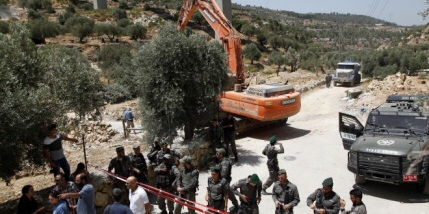In May of 2015, Israel commenced with the construction of the apartheid wall in the northern Bethlehem area; namely the area around the Cremisan Valley in Beit-Jala, without taking into consideration the valley’s potential of outstanding universal value. The site is an integral part of the serial nomination ‘Palestine, Land of Olives and Vines’, which also includes the ‘Cultural Landscape of Southern Jerusalem, Battir’.
On February 2nd, 2016 the Israeli Antiquities Authorities commenced with an archaeological excavation at Khirbet en-Najjar, which contains ruins of human settlements dating back to the Roman period.
In the absence of a final peace agreement, the Israeli occupation is bound by provisions to securing the occupied Palestinian state’s cultural and natural heritage, and is responsible for its protection in accordance with international law — namely, the Hague Convention and Regulations of 1907, the Fourth Geneva Convention of 1949, and the Hague Convention and Protocol of 1954 for the Protection of Cultural Property in the Event of Armed Conflict.
These provisions are in addition to the UNESCO Recommendations on International Principles Applicable to Archaeological Excavations in New Delhi in 1956, the Convention on the Means of Prohibiting and Preventing Illicit Import, Export and Transfer of Ownership of Cultural Property, the 1972 World Heritage Convention, along with other resolutions and recommendations concerning cultural property in Palestine.
The archaeological excavation at Khirbet en-Najjar is, according to the PNN, being conducted by the Israeli cccupation’s Antiquities Authority, without informing Palestinians. The initial investigation conducted by the Palestinian Department of Archaeology and Cultural Heritage revealed that several artifacts and objects were found during the excavation, and were confiscated by the Antiquities Authority. Moreover, the construction of the wall in the Cremisan Area, and the archaeological excavation at Khirbet en-Najjar, are considered a clear violation of international laws and agreements.
The Palestinian Ministry of Tourism and Antiquities condemned the occupation’s acts of destruction before cultural and natural heritage resources, and is appealing to the international community to immediately take all measures necessary in order to pressure Israel to permanently cease construction of the wall and excavations on and around the Cremisan Valley, and to refrain from further unilateral actions that could inflame the situation.
Search IMEMC: ‘Cremisan’

